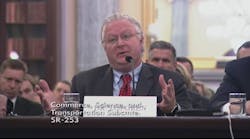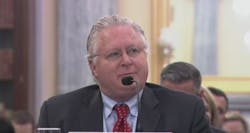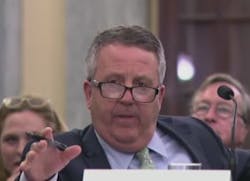A leading Senate proponent of more strict truck safety regulations called it “stunning,” after hearing the details of fleet-wide accident reductions through investment in advanced safety systems—but the CEO of one of the country’s largest trucking companies quickly explained that the trucking industry didn’t need more regulations, just the “right” ones.
The Wednesday hearing by the Senate Commerce subcommittee on surface transportation was scheduled to focus on federal highway funding, but senators’ questions and testimony from Schneider National CEO Chris Lofgren veered to safety regulations, state labor laws, trucking’s competition and cooperation with rail, and even the impact of White House trade policy on freight.
Indeed, Chairman Deb Fischer (R.-NE), along with calling for new sources of infrastructure funding and for expanding the federal freight program, soon shifted to the negative impact on efficiency of “the challenging regulatory environment,” and to her previous work in reforming the Federal Motor Carrier Safety Administration.
“The FMCSA now needs to conduct a more transparent, inclusive, and responsive regulatory process with stronger cost-benefit analysis,” Fischer noted in her opening statement.
But Sen. Cory Booker, the subcommittee’s ranking member and a vocal opponent of rolling back trucking regulations, made a point to include safety in his stark assessment of the deteriorating U.S. highway system.
“Right now we’re seeing a startling increase of traffic fatalities on our highways, specifically involving large trucks,” Booker said in his remarks. “We can and must do better.”
And in subsequent questioning, Booker asked Schneider’s Lofgren directly: “Talk to me specifically about what your industry could or should be doing to make us more safe out there—because the gravity of the carnage and injury is just stunning.”
Lofgren quickly emphasized that problem is largely with the greater “motoring public,” and that any review of Schneider truck camera footage could be seen as “a comedy” if it weren’t so serious.
“That’s not to say that we haven’t at times really messed things up and very, very horrific things have happened,” Lofgren said. “But as we think about putting in regulations, the reality is if you look at the dramatic improvement in rear-end accidents that we’ve had as a company since we put the [Meritor Wabco] OnGuard technology in, it speaks for itself. The reality is, there is no requirement that a Class 8 vehicle coming off the line today have that equipment on it as standard.”
Lofgren referred to the statistic he cited in his opening testimony: a 69% decrease in rear-end accidents and a 95% reduction in rear-end accident claims cost since installing the collision mitigation system.
“There’s regulations that I don’t think are productive that we operate under in this industry,” he continued, but, with so much evidence as to the technology’s effectiveness, “there ought to be incentives to get people to invest.”
Lofgren added that many other carriers also already are making these investments.
Booker interjected: “The data in your testimony was stunning—and that you’re doing this not as a mandate.” He then quipped that, “I do want to note for the record that an industry leader just called for more regulation.”
But in his testimony Lofgren criticized “a general trend of restrictive and complex regulation,” and FMCSA’s use of guidance rather than rulemakings, resulting in “an unintended sense of uncertainty” within trucking. In responding to questions, he explained the trucking companies have worked together to develop safety best practices, and “the industry stands ready” to help develop data-driven government policies.
“There is a willingness, there is an awareness, and I think the way we get to the right kinds of answers is to engage the people doing the work with the people regulating the work, with the people legislating the work,” Lofgren said, “because there is enough data today coming off our trucks to get to the right answer. Nothing is worth having somebody injured—and my best competitors would line up with that. There is a pathway; we just have to get on it.”
Highway funding, state labor laws
As to highway funding, Lofgren emphasized that U.S. global competiveness “depends on a robust freight system driven by the trucking industry,” and said that trucking “recognizes we have to pay our fair share.” He also said that, given the ever-increasing shortfall of the Highway Trust Fund, he would support direct federal funding from other sources.
But the freight rail representative on the panel, BNSF Railway Executive Chairman Matthew Rose, was quick to note a “caveat” to the rail industry’s support: maintaining “the modal balance of equity” between highways and rail.
“We pay for nearly 100% of our own infrastructure in the railroad industry. And what you should want, for the next ton of freight that’s moved in this country, is that somehow it gets off the highway and gets put to the railroad industry because of our efficiency, our environmental impact, and because then you don’t have to pay for that next road paving on the highway system” Rose said. “As long as trucks continue to pay for the use of the highway network, it’s great. If we lose the economic tilt, if we move away from the user-pay system and pay with general revenues, you’ll be subsidizing railroad’s largest competitor—and our largest customer—and you’ll get more and more trucks on the highway network. I don’t think that’s what anybody in this town wants.”
Questioned about the impact on fleet operations of state labor laws, Lofgren explained that rest break laws such as those in California have evolved from agriculture worker protections. But, as applied to truck drivers who need to pull off the road, such work rules pose “a safety hazard” and “create issues” for interstate carriers.
“We want our drivers to take breaks, to do things safely. We encourage them to do that—when it’s safe, at appropriate times,” Lofgren said. “Those regulations put us at odds and it frankly makes it difficult. It’s about recognizing how [trucking] works and making sure the requirements align with that.”
As for the impact of a potential Trump Administration trade war, Schneider has “significant operations” that move freight into and out of Mexico, and any NAFTA treaty revisions “will not be helpful.”
“A lot of our customers have significant manufacturing facilities [in Mexico],” Lofgren said. “I’m pretty sure it’s not going to go zero, but there’s no doubt that if the path that we’re on continues, we’ll see a reduction in the amount of business that we’re going to conduct between the U.S. and Mexico.”





